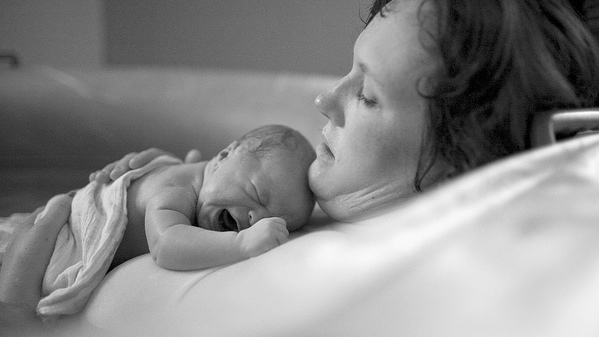
When we’ve been through the intense, and often earth-shattering experience of giving birth (or witnessing it), we all have our own story to tell.
Whether we felt like it was our greatest achievement, a miraculous event, just a job we had to do, or whether it shook us to our core—as humans, we naturally articulate our experiences through stories.
For a brief time at the moment of birth and shortly after, we have not yet formulated words to express what we just went through. Here, often shock and a hormonal haze overtake us. Many of us feel out of our bodies, in a surreal state, trying to comprehend the enormity of what our body, mind, and psyche just endured. We often find it hard to believe that wriggly, wet little human just came out of our body—and we are finally holding them.
One birth: more than one version.
Every person who was part of our birth experience, not only becomes part of our story, but will also have their own version of events about our birth. Depending on their unique views, perception, and experiences of birth, their story could be quite different to the story we lived.
Often, in those early moments after birth, those around us already—without realising—start imparting their own views of our birth upon us, before we have even had time to have our own story about it. Comments from birth workers are often well-intentioned. Sometimes, they are simply making conversation, without considering the impact these words could have.
Comments like, “You were so strong,” “I bet you’re glad that’s over,” “That’s the worst haemorrhage I’ve ever seen,” “That baby was never going to come out,” or “You were so calm,” may seem harmless (or even complimentary), yet they can instantly change that person’s story forever. In fact, some of us will actually end up telling our midwife, doctor, doula, or partner’s story of our birth, without realising it isn’t our own story.
When someone else’s comments don’t match our lived experience, this can be a source of confusion, upset, and even trauma as time goes on. If someone tells us how strong we were, when we felt something else entirely, we can be left wondering if that person was actually at the same birth we were, and how their impression of our birth could be at such odds with our own.
Influenced from many angles.
The way we perceive our own experience of birth is, of course, influenced by every idea, belief, and story we have ever absorbed about birth. We all grow up with a certain cultural narrative about birth that we view as the truth. We may have family myths and stories about how women in our clan birth, which we may take on without question, or reject, depending on the other ideas we hold or learn about birth.
The childbirth education we choose can influence how we come out on the other side too, how we perceive what happened, and what this means about us as a person or mother. All of these different influences will serve as a lens through which we view our own experience. No matter how our birth appears on paper, the facts, figures, and centimetres—our internal experience and narrative of our birth is how we make meaning of it. As humans, making meaning about what we experience in life is what we do.
How listeners respond can change our story again.
Most of us will share our birth story at some point, whether it’s with just with a few close people, in a mothers’ group, with family and friends, online, or with anyone who will listen. When we do this, there is further potential for our story to alter. We share our birth stories for different reasons, but primarily as a way to process our experience. We might share our story to seek approval, acceptance, to bond, inform, warn, or compete.
How our listeners respond—even with just their body language—can affect our telling of it. If we sense our listener is uncomfortable or scared, we might tell that part of our story differently next time, or sometimes stop telling it. If we tell another part and it’s taken well, or even celebrated, we might exaggerate this part from that point on.
It’s normal for birth stories to evolve as time goes on—and as we process and work through them. We’re not going to tell the same story when we are 20 years post-birth that we tell in the months after it. However, it’s clear that after birth there are many ways in which our story can change because of others’ perceptions, stories, and responses, so that gradually our birth story isn’t quite the same one.
Of course, with time our memory fades, so that only certain important moments—often the difficult, unresolved ones or the more joyful ones—are what we tend to recall.
So, how can we preserve those important aspects of our birth stories in their truest form—our lived birth story?
We can allow women and their partners to be in that space of nothingness after birth. As birth workers or even visitors shortly after birth, not give our impressions (positive, negative, or neutral), opinions, or own stories about what happened. As listeners of birth stories we can aim to listen, not judge, advise, give opinions, or compare with our own experiences. This is easier said than done—but something we can all strive to do.
My dream is that every one of us who gives birth or witnesses birth, could have a constructive process with a birth story listener, or healer to explore our experience. To have support to shift any lingering confusion, upset, or trauma, so we are all able to tell our story from a healed, compassionate, and integrated place.
Not only can this help us to get in touch with our own lived story, but by processing our experience, our little piece of the cultural narrative of birth can impact in a more positive and balanced way.
~
“If we are to heal the planet, we must begin by healing birth.” ~ Agnes Sallet Von Tannenberg
~
Author: Nicole Tricario
Image: Jason Lander/Flickr
Editor: Lieselle Davidson
Copy Editor: Sara Kärpänen
Social Editor: Leah Sugerman











Read 0 comments and reply